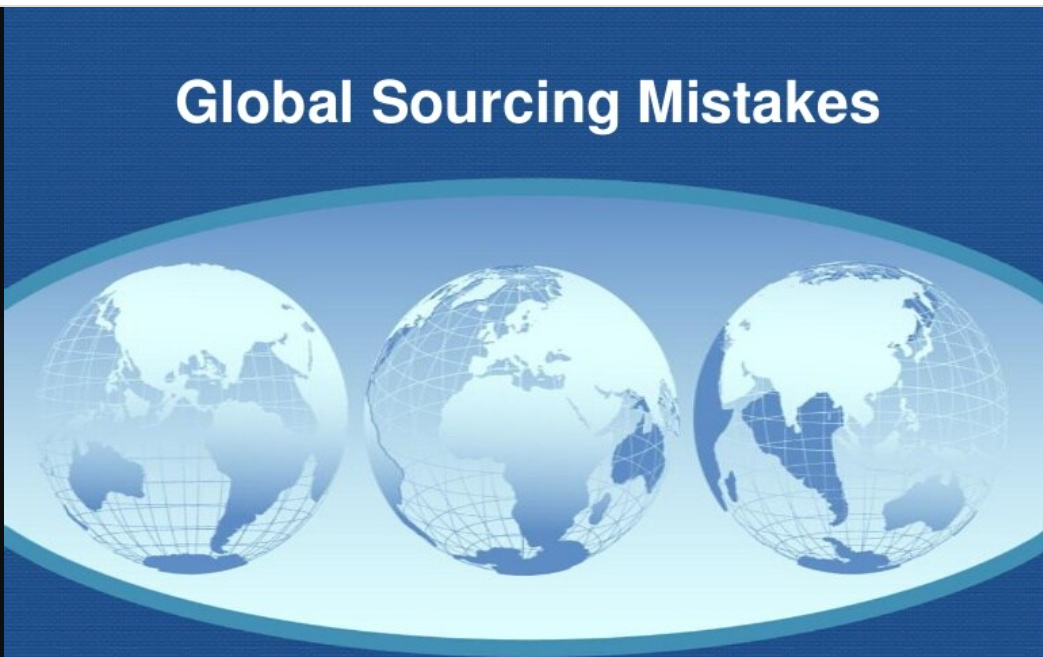Who hasn’t heard of the term global sourcing by now? It’s become so popular in the business world today, even businesses that don’t directly deal with import or export get involved with global sourcing in some way or another, often without realizing the risks they are taking. There are many challenges when it comes to global sourcing, but there are also many mistakes that you can avoid to help ensure that your global sourcing campaign is successful and profitable, rather than unsuccessful and costly. Here are 7 common mistakes you should avoid when entering into global sourcing endeavors of any kind.
1) Not Understanding Local Customs
Not understanding local customs when working with international employees can be a dangerous mistake. Cultural differences often lead to failure in global teams or businesses. So, it is important to have an idea of what you are getting into when outsourcing abroad. Though it may not seem like a huge issue at first, if you don’t take these cultural differences into account when hiring overseas workers, you could end up facing costly consequences down the road. Make sure to understand how your potential employees are expected to conduct themselves within their own culture before signing any contracts with them or bringing them on board.
2) Being Unprepared to Negotiate
If you want to get a good deal on a product or service, you need to know what you’re doing when it comes to negotiating. After all, people from other countries often have different ways of conducting business and bargaining. In some cases, they might not even negotiate at all! If they do engage in negotiations with you, they may behave differently than people from your home country. For example, if a vendor wants a quick sale, he might offer something for free—like delivery—in order to win over your business. Of course, make sure that whatever’s being offered is part of his normal sales process before accepting it.
3) Ignoring Culture
Not everyone likes to dress for success. It may be hard to believe, but just because something works in one region doesn’t mean it will work in another. Accepting global standards wholesale—whether they’re your standards or someone else’s—can be costly. For example, cutting costs on formalization may seem like a good idea at first glance, but if you can’t comply with local requirements for registering your business or keeping proper records, you could lose any competitive advantage you hoped to gain by ignoring culture. Don’t try to save money by skimping on local requirements; doing so can end up costing far more.
4) Not Understanding Local Labor Laws
One of my favorite business quotes is ‘They laughed at Christopher Columbus, but he didn’t sit around laughing. Now if that doesn’t motivate you to think about why local labor laws are important then I don’t know what will. If you’re not familiar with how labor laws work and what they entail you could face fines, lose customers and even run into more serious problems like: wrongful termination. To make sure global sourcing companies aren’t causing more problems than it’s solving, make sure you know your local labor laws.
5) Failing To Consider Import Taxes
Many first-time importers assume that customs duties and fees are all they need to pay upon importing, but often they fail to consider import taxes. These can include value-added tax (VAT), goods and services tax (GST) or other types of consumption taxes. Some countries also charge border tax adjustments, which act as surcharges on imported goods. Understanding these additional charges before finalizing your international sourcing strategy is key to ensuring you don’t get hit with surprise costs upon exporting your product for sale.
6) Not Learning the Language
A lot of companies start outsourcing by sending over a large batch of work and expecting things to happen. If you’re trying to communicate with your outsourcer, that won’t go well. Unless they know how to speak English, they won’t be able to explain what you need in such a way that there aren’t delays. Unfortunately, it can take time for them to learn enough English (if at all) and for you to learn their language. It’s worth putting in time upfront; getting your project off on the right foot is crucial when dealing with China sourcing company and other countries where English may not be widely spoken.
7) Not Considering Logistics
If you’re outsourcing your manufacturing, ensure that your suppliers and manufacturers are located in an area where it’s easy to move goods from their facilities to yours. In some cases, it may make sense to create a warehouse near your supplier or manufacturer if it would save you time and money by allowing for quick shipments from overseas.
Related posts
Subscribe Now
* You will receive the latest news and updates on your favorite celebrities!
Meet the Author

Gillion is a multi-concept WordPress theme that lets you create blog, magazine, news, review websites. With clean and functional design and lots of useful features theme will deliver amazing user experience to your clients and readers.
Learn moreCategories
- Animals (6)
- Business (579)
- Cooking (3)
- Design (17)
- Education (59)
- Entertainment (62)
- FASHION (89)
- Fashion (39)
- Featured (19)
- FOOD (42)
- Guide (55)
- Health (290)
- HOME (184)
- Interior (14)
- Life (8)
- Lifestyle (111)
- Motivation (6)
- News (47)
- People (4)
- Photography (5)
- Review (4)
- Style (4)
- TECH (176)
- Travel (107)
- Uncategorized (1,441)



Stay connected